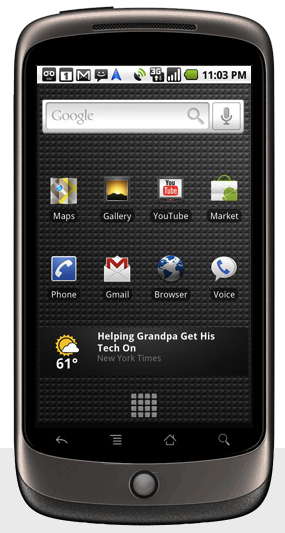Android Phone Can Be Used as a Supercomputer
This supercomputer fits in your pocket.
When you hear 'supercomputer' and 'small' in the same sentence, you likely wonder how small a room are they talking about. However, when the folks at MIT and Texas Advanced Computing Center say small, they mean small as in pocket-sized.
A collaboration between MIT and the Texas Advanced Computing Center has led to an Android application that the two institutions claim can do honest-to-goodness supercomputing.
TACC explains that the team at MIT performed a series of expensive high-fidelity simulations on TACC's Ranger supercomputer and then generated a smaller, reduced model, which was used to create an Android application for a Nexus One.
"You don’t need to have a high-powered computer on hand," insists David Knezevic, a post-doctoral associate in mechanical engineering at MIT. "Once you've created the reduced model, you can do all the computations on a phone."
Though this kind of model reduction has been done before, TACC says the MIT system's real advantage is its rigorous error bounds, which tell the user the range of possible solutions, and provide a metric of whether an answer is accurate or not.
Knezevic goes on to say that using a reduced scale model also results in faster computations.
"The payoff for model reduction is larger when you can go from an expensive supercomputer solution to a calculation that takes a couple of seconds on a smart phone," he said. "That’s a speed up of orders of magnitude."
Get Tom's Hardware's best news and in-depth reviews, straight to your inbox.
Check out MIT for a video of the process in action, or TACC to learn more about how they did it.

Jane McEntegart is a writer, editor, and marketing communications professional with 17 years of experience in the technology industry. She has written about a wide range of technology topics, including smartphones, tablets, and game consoles. Her articles have been published in Tom's Guide, Tom's Hardware, MobileSyrup, and Edge Up.
-
husker It sounds to me like they had the supercomputer do all the hard calculations so that the phone could just take shortcuts by looking up the answer. Kind of like if I said "what's the (square root of 191) + 1?" Then all you would have to do is look up the square root of 191 in a table, and then add 1 to it. Wow! You're a human calculator!Reply -
welshmousepk Surely 'supercomputer' isn't an easily definable term?Reply
the average gamin computer has exponentially more power than the original 'Supercomputers' that were used to send man to space.
by any solid definition, just about every advanced computer made today short of a netbook could be classed as a supercomputer. -
cookoy Baloney! Making a device (smartphone, laptop, desktop) run a reduced, scale-down model of an app that used to run on a supercomputer does not make the device a supercomputer. Taking journalism to the extreme.Reply -
annymmo Stupid article name.Reply
Expected supercomputers, not dumbed down simulations that run on smartphones.
Write more accurate names in the future, tom's hardware! -
tacoslave 2+2=01010010101001001010Reply
ok hands me cash and toms right an article about this "super computer" -
pasoleatis It is called coarse graining. For example you do not need to know the positions of each atom when we study a fluid, we can consider a model in which we solve up to a piece of thousands or tens of thousands of atoms. This order of magnitude faster, but you first need to check the if the coarse grained model is valid and compare with less approximate models.Reply -
makaveli316 Smartphones are all crap, i'm done with them. I used to had from iPhone to Nokia ecc. and they are all the same - big, heavy, fragile with buggy software, not to mention the ridiculous price nowadays.Reply
You just can't put a smartphone on the market which has the same price as a laptop or pc.
A cellphone is made for calling and texting, that's it, everything else (apps ecc.) after a week of use or so, is becoming annoying and useless, unless you're a 14 years old kid who thinks he's cool having a smartphone.
-
joytech22 tacoslave2+2=01010010101001001010ok hands me cash and toms right an article about this "super computer"Reply
WRONG!! In Binary, 2+2=100. You see, the (1) in said number = 4, while the second 0 would equal 2, and the last 0 would equal 0 or 1.
Using that logic, your answer was wrong, so i deserve the cash more than you! :D Oh and i pretty much based that off networking.
